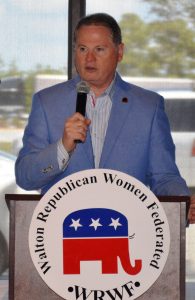
By DOTTY NIST
“I’m very excited about the future of this institution,” Dr. Devin Stephenson, said of Northwest Florida State College (NWFSC). He serves as NWFSC president, having taken office in January.
Stephenson was featured speaker at the Walton Republican Women Federated (WRWF) regular monthly meeting at Cantina Laredo on April 19.
The Alabama native and current Niceville resident has an extensive background in the field of education, coming to NWFSC from Big Sandy Community and Technical College in Prestonsburg, Ky., where he held the office of president and also having previously served as president at Three Rivers College in Missouri, as vice-president for external affairs and dean of students at Bevill State Community College in Sumiton, Ala., and as chief executive officer at Snead State Community College in Boaz, Ala.
“I love to get involved in the community,” Stephenson told the group, expressing eagerness to help with economic and workforce development.
He was proud to report NWFSC having been recognized as among the top 150 community colleges in 2017 by the Aspen Institute, an educational and policy studies organization based in Washington, D.C. Stephenson said his goal was to “make us the best of the best of the best.”
He was appreciative of bills filed in the Florida Legislature to fund repair and renovation of the NWFSC engineering building and other upgrades. He indicated that he is intent on working with legislators to garner their continued support with appropriations.
Stephenson spoke of new programs for which plans are in place to get started on in the near future, among those a hospitality management program, a culinary arts program and construction on campus of a simulated city for workforce training. He also was optimistic about adding new locations for the college to the six currently existing in the region.
To summarize his vision to move NWFSC forward, he concluded his remarks by referring to and commenting on five illustrations, each displaying one of the letters of the NWFSC acronym: “N” for nurture of relationships, “W” for work to expand resource development, “F” for focus on sustainable programs, “S” for strong student initiatives, and “C” for “culture of excellence.”
Asked about the NWFSC graduation rate, Stephenson responded that it is 40 percent—and pledged to improve the rate by going from traditional student advisors to “navigators.” These personnel would be charged with identifying “pressure points,” often monetary situations, that cause students to drop out, and helping “push our students through.”
“It’s an embarrassing statistic, but we can change it,” he told the group.
